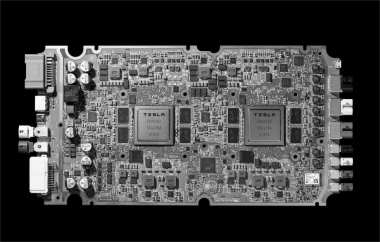
Reports confirm that Tesla's next-generation Full Self-Driving (FSD) chip, AI5 (formerly known as HW5.0), has entered mass production. The chip is being manufactured using TSMC's cutting-edge 3nm N3P process technology.
The AI5 chip boasts a computing performance of approximately 2,000 to 2,500 TOPS (trillions of operations per second), representing a fivefold increase over the current HW4.0 chip, which delivers around 500 TOPS. This substantial boost in processing power enables support for more advanced unsupervised FSD algorithms. For comparison, NVIDIA's latest GPUs, the RTX 5080 and RTX 5090—priced roughly at $1,500 and $3,000 respectively—offer performance levels of 1,800 TOPS and 3,400 TOPS.
TSMC remains Tesla's primary foundry partner for the AI5 chip, leveraging its N3P 3nm node for volume production. Samsung is positioned as a secondary foundry option, expected to be engaged in large-scale production around 2026, when Tesla plans to roll out AI5-equipped vehicles extensively.
Tesla intends to gradually enhance FSD capabilities on AI5 and its upcoming AI6 chips to improve safety features. However, these upgrades will not be applied retroactively to earlier vehicle models. Upgrades will only be deployed if existing vehicles cannot operate unsupervised FSD more safely than a human driver. This approach ensures that while newer hardware offers superior performance and safety, previous-generation vehicles remain safe for autonomous driving.
In addition to the chip advancements, Tesla plans to equip the AI5 hardware suite with upgraded FSD cameras. Samsung is providing weather-resistant lenses featuring built-in heating elements capable of melting ice and snow within one minute, minimizing image distortion in adverse conditions.
Separately, Tesla will launch a fully autonomous Robotaxi pilot program in Austin starting June 21, deploying an initial fleet of 12 Model Y vehicles equipped with HW4.0 hardware to test complete driverless functionality.




